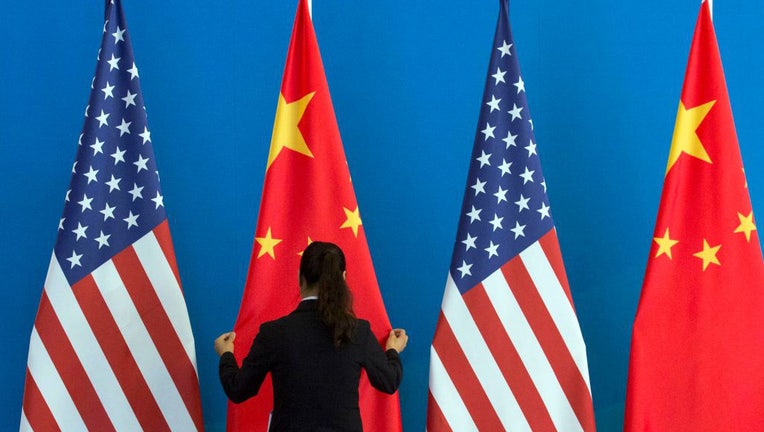China sentences US citizen, 78, to life in prison on spying charges

FILE - A Chinese woman adjusts a Chinese flag near US flags before the start of a Strategic Dialogue expanded meeting between China and the US during the US-China Strategic and Economic Dialogue held at the Diaoyutai State Guesthouse in Beijing on Ju
BEIJING - China sentenced a 78-year-old United States citizen to life in prison Monday on spying charges, in a case that could exacerbate the deterioration in ties between Beijing and Washington over recent years.
Details of the charges against John Shing-Wan Leung, who also holds permanent residency in Hong Kong, have not been publicly released.
Leung was detained April 15, 2021, by the local bureau of China's counterintelligence agency in the southeastern city of Suzhou, according to a statement posted by the city’s intermediate court on its social media site. His detention came after China had closed its borders and imposed tight domestic travel restrictions and social controls to fight the spread of COVID-19.
Such investigations and trials are held behind closed doors and little information is generally released other than vague accusations of infiltration, gathering secrets and threatening state security.
Relations between Washington and Beijing are at their lowest in decades amid disputes over trade, technology, human rights and China’s increasingly aggressive approach toward its territorial claims involving self-governing Taiwan and the South China Sea. High-level government visits have been on hold and U.S. companies are delaying major investments amid mixed messaging from Beijing.

China warns U.S. of possible 'conflict and confrontation'
China’s foreign minister has warned Washington of "conflict and confrontation" if it fails to change course in relations with Beijing. Christopher Heurlin, Associate Professor of Government and Asian Studies at Bowdoin College, joined LiveNOW from FOX's Josh Breslow to discuss those comments.
The sentencing comes as U.S. President Joe Biden is traveling to Hiroshima, Japan, for the Group of Seven major industrial nations summit, followed by a visit to Papua New Guinea, a Pacific island nation in a region where China has sought to increase its economic, military and diplomatic influence. After Beijing's gains in the area, the U.S. and its Asia-Pacific partners stepped up their regional presence, offering investments and financial support rivaling those furnished by China.
Now the world's second-largest economy, China is expanding its footprint in ports, railways and other infrastructure from Europe to Southeast Asia and beyond.
While the Suzhou court offered no indication of a tie to overall China-U.S. relations, spying charges are highly selective and evidence backing them up is not released. That is standard practice among most countries, who wish to secure their personal connections, networks and access to information.
RELATED: US Army under pressure to make more ammo for Ukraine, potential conflict with China
However, China’s authoritarian political system and the ruling Communist Party’s absolute control over legal matters, civil society and freedom of information forestalls demands for further information, as well as court appeals.
The U.S. Embassy in Beijing said it was aware of the case, but could not comment further due to privacy concerns. "The Department of State has no greater priority than the safety and security of U.S. citizens overseas," the embassy said in the emailed statement.
The government of Hong Kong, a former British colony that reverted to Chinese control in 1997, had no immediate word on Leung's sentencing.
When it was returned to China, Hong Kong was promised it would retain its financial, social and political liberties, but Beijing has essentially scuttled that commitment since cracking down on pro-democracy protesters and imposing a sweeping national security law in 2020.
Chinese national security agencies have also raided the offices of foreign business consulting firms in Beijing and other cities as part of a crackdown on foreign businesses that provide sensitive economic data.

Expert breaks down significance of China-Russia visit
Chinese President Xi Jinping has traveled to Moscow to meet with Russian President Vladimir Putin.
Foreign companies operating in China have come under increasing pressure as Xi Jinping’s government tightens control over the economy. That stands in stark contrast to efforts to lure back foreign investors after draconian COVID-19 pandemic restrictions were lifted at the beginning of the year.
Long pretrial detentions are not unusual in China and prosecutors have broad powers to hold people charged in national security cases, regardless of their citizenship status.
Two Chinese-Australians, Cheng Lei, who formerly worked for China’s state broadcaster, and writer Yang Jun, have been held since 2020 and 2019 respectively without word on their sentencing.
Government suspicion is particularly focused on Chinese-born foreign citizens and people from Taiwan and Hong Kong, especially if they have political contacts or work in academia or publishing.
Under Xi, the party has launched multiple campaigns against what it calls foreign efforts to sabotage its rule, without showing evidence. Universities have been ordered to censor discussions of human rights, modern Chinese history and ideas that could prompt questions about total Communist Party control.
Xi's government has also taken a hard line on foreign relations, most recently ordering outa Canadian diplomat in retaliation for Ottawa's expulsion of a staffer at the Chinese embassy accused of threatening a member of the Canadian parliament and his family members living in Hong Kong.
That meshes with Xi's confrontational global stance that has seen China partner with Russia in accusing the West of provoking Moscow's invasion of Ukraine and seeking to overthrow the U.S.-led liberal dominance of global affairs.
RELATED: Russia accuses Ukraine of trying to assassinate Putin in drone attack; Zelenskyy denies

